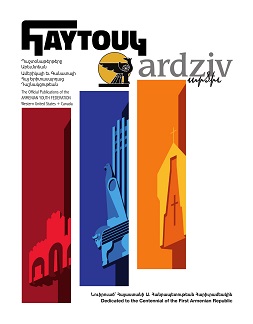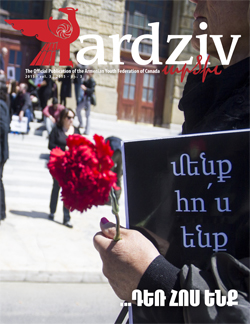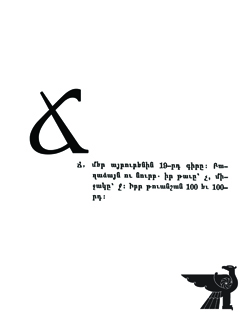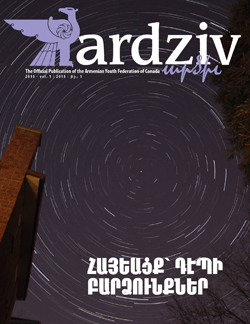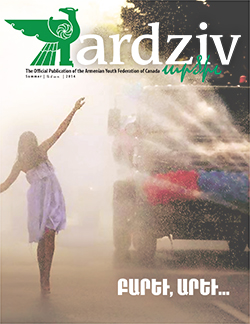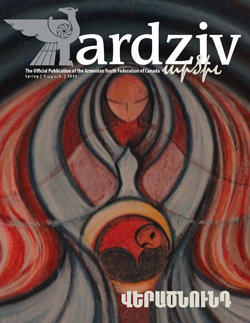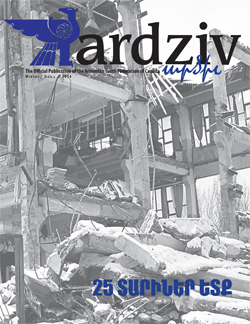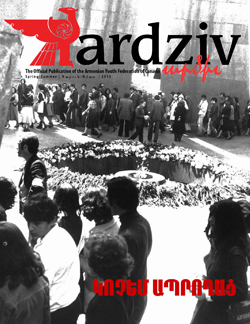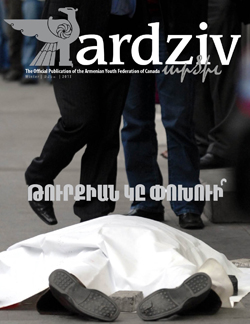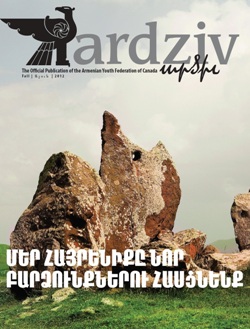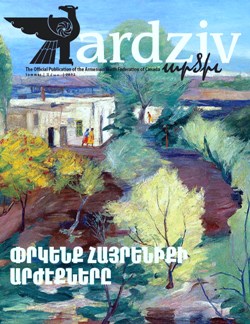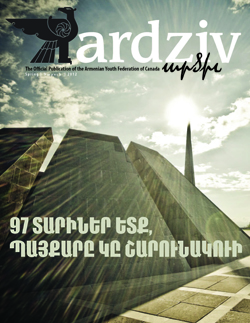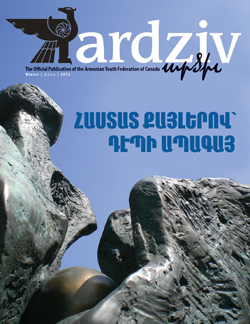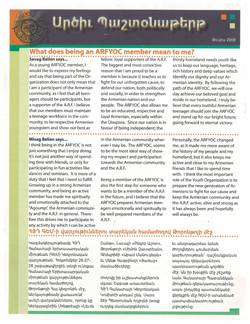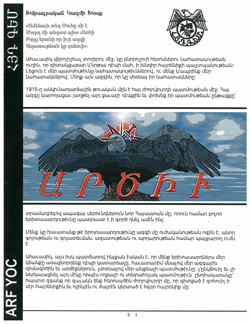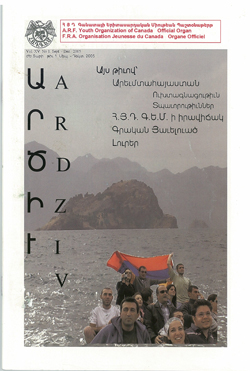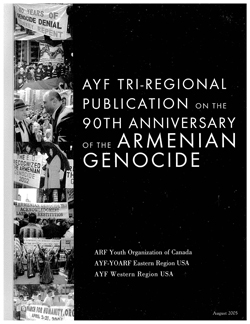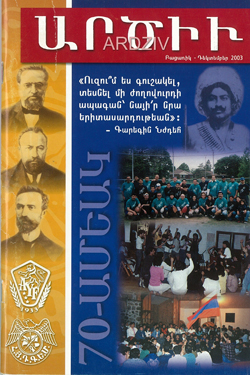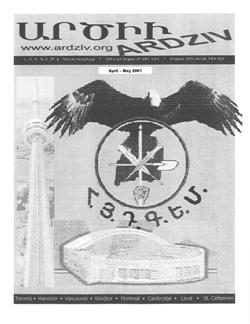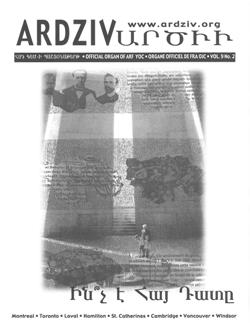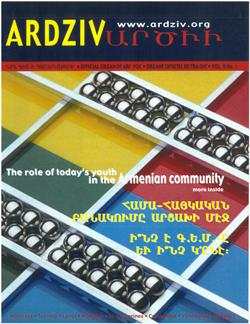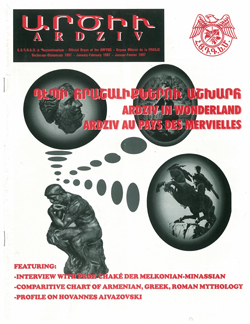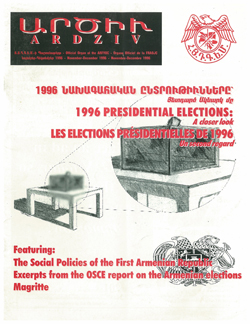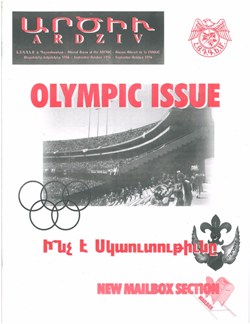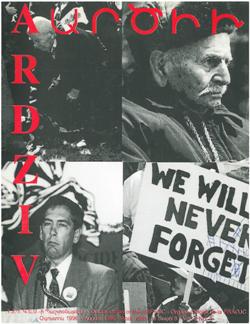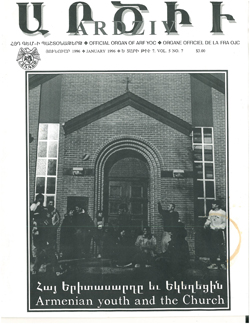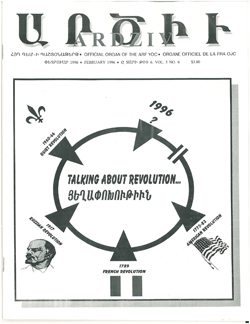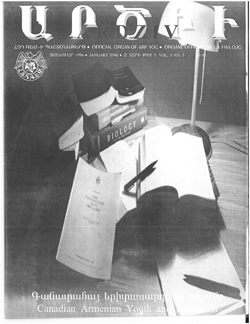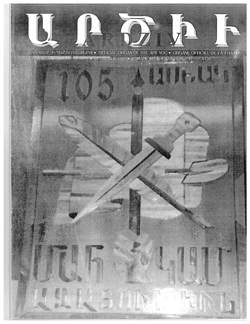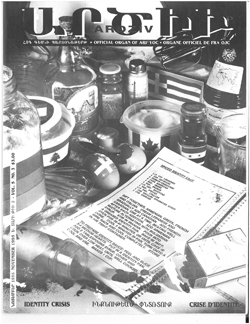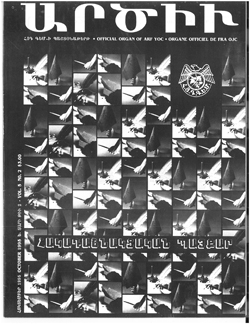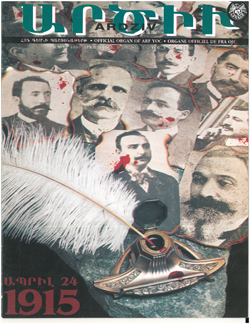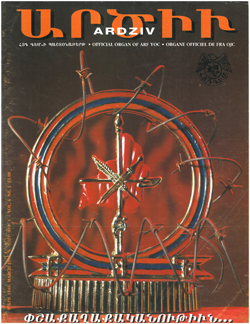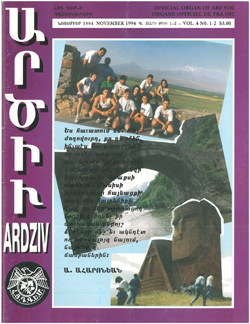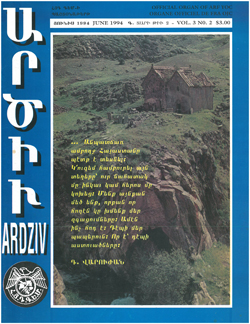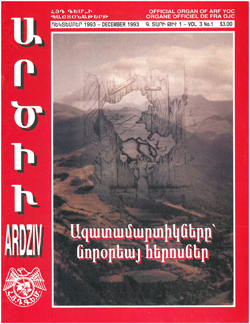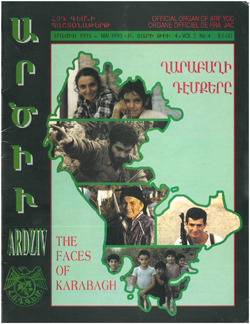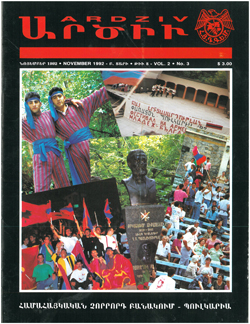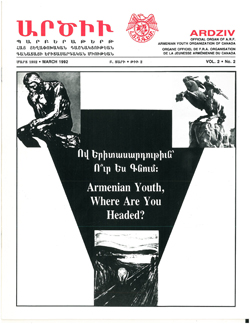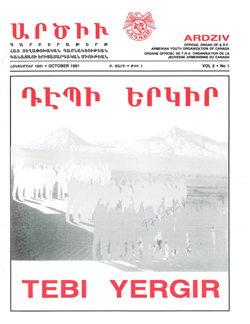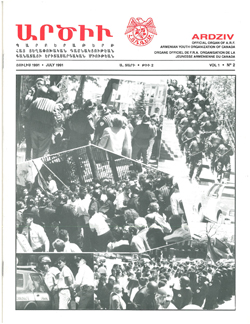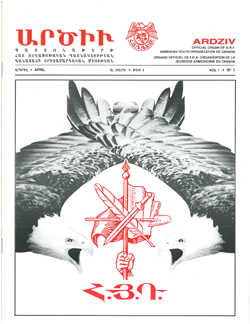Uniting A Nation: The case for Armenian Diaspora representation
By: Shant Karayan | Posted on: 30.09.2011Warning: Undefined array key "ssba_bar_buttons" in /home/u108981792/domains/ardziv.org/public_html/wp-content/plugins/simple-share-buttons-adder/php/class-buttons.php on line 602
Warning: Undefined array key "ssba_bar_buttons" in /home/u108981792/domains/ardziv.org/public_html/wp-content/plugins/simple-share-buttons-adder/php/class-buttons.php on line 602
Warning: Undefined array key "ssba_bar_buttons" in /home/u108981792/domains/ardziv.org/public_html/wp-content/plugins/simple-share-buttons-adder/php/class-buttons.php on line 602
Warning: Undefined array key "ssba_bar_buttons" in /home/u108981792/domains/ardziv.org/public_html/wp-content/plugins/simple-share-buttons-adder/php/class-buttons.php on line 602
There are many tragic consequences to the Armenian Genocide. The millions of people brutally murdered, deported or forcefully assimilated is the most direct and obvious consequence of the Ottoman government’s heinous campaign of destruction. Of course, this loss of life is the most disastrous of consequences but infrastructure for one is the consequence we can most easily put a price tag on. Several specialists say that there was over 180 billion dollars (in today’s USD) worth of public infrastructure destroyed or confiscated by the Ottoman and later Republican authorities that once belonged to Armenian interests. That’s about 20 times the worth of the economy of today’s Republic of Armenia.
This essay does not deal with any of that however. This essay will treat what has been one of the seldom uttered realities of the post-genocide Armenian nation; the complete and utter lack of representative politics. It is true that most of the Armenian intelligentsia perished during the Medz Yeghern, and the timing could not have been worse. In a period of great political,intellectual and cultural evolution, most of the greatest leaders of this small but determined nation suddenly vanished and left a void hardly filled by the handful that remained. The Levon Shant’s, the Vratsyan’s, the Aghpalyan’s of this world were handed the sorry task of caring for refugees, fighting epidemics and making sure inflation does not destroy this hardworking people’s future prospects. Alas, none of them had the gift of foresight to be able to see the glooming threats of both Republican Turkey and Soviet Russia. They had no time for nation building, or the transmission of political values as the need for self preservation handed the burgeoning Republic to the hands of the Soviet Union. As a result, the Armenians dispersed in the Diaspora waited 50 years before being able to create strong networks of political leadership. But is it enough? The structure of Diasporan leadership today could be considered outdated and ill prepared for the globalized world we live in. It is time for a Nation, politically divided by the sword of the Turk to reunite and usher a new era of strength and cooperation. It is time for an Armenian Diasporan Parliament.
Creating a new Armenian Parliament, able to accommodate the voice of the Diaspora, seems like a logistical nightmare at best, and ludicrous at worst, but I ask the reader to keep an open mind. Armenia and the greater Diaspora exist in an increasingly globalized world and post modern thought or “thinking outside the box” as it is most commonly referred to, is necessary to accomplish the exemplary. The idea is not all that farfetched. Kenya recently developed a similar process, as have Macedonia and Italy in the past. What is important to note is that these nations understood the vital asset that their Diaspora can constitute and have taken steps to leverage it accordingly. What we must do, as one of very few nations to have a Diaspora larger than the Nationals is first, accept the fact that the Spyurk has equal right and responsibility in determining the course of the Nation’s future and as such, should have equal representation. The first problem immediately strikes the reader here. How can (in most cases) non-nationals – as most Diaspora Armenians are – be made to determine legislation and politics of a sovereign state?
Philosophically, all that needs to be done is to question the definition of “National”. Must one be a citizen to be deeply involved and affected by the fate of the country he calls Fatherland? Does the foreign policy or economic reform of Armenia affect me, even though I am a Canadian citizen? It seems evident to anyone who would identify themself as Armenian or armenophile, that they hold these issues as dear to them as the Infrastructure in Montreal and the state of the Canadian health-care system. What will really be the challenge is aligning this within the technical framework of the Constitution of the Republic of Armenia. Although the constitution allows for the possibility of dual citizenship, you must still be a resident of the Republic in order to be elected to office, and in some cases, you must be a resident for over 10 years to do so. Changing the constitution in this manner would be difficult and quite possibly seen as counterproductive. How can one who in essence has not lived the reality of the country be elected to lead it? This is not what I am proposing. What needs to be implemented in the constitution is a second level of citizenry, one that would allow for certain rights and liberties while encompassing the geographical limitations of the new citizens. Citizen of the Diaspora of Armenia. This status, if encompassed correctly within the Constitution of the Republic of Armenia could solve the issues of the “takeover” of Diaspora Armenians in the internal dynamic of the republic. As such, the status of Citizen of the Diaspora of Armenia would extend some rights to the Armenians around the world, such as a right to vote, but limit it to a framework based on relevance. For instance, a Diasporan Armenian should not have a say in what colour the public bus network of Yerevan should use in their logo, but should be able to participate in any referendum pertaining to how the constitution is modified as this has implications on the Armenian race as a whole.
Another challenge is to determine how this new status of citizen would be incorporated as a part of the structure of the Armenian state. Several different options have been seen in the past and have more or less proved useful to different countries around the world. Some promote a committee of counsellors, volunteers appointed to give their ideas about how Diaspora should be handled. Although comprised entirely of members of the Diaspora, this council would hold little sway on the overall governance of the country. Others have suggested including several seats in their national Parliament dedicated to representatives of their Diaspora. More official than the council mentioned earlier, 5-6 seats in parliament hardly constitute any type of effective representation. I would propose a solution as unique as the Armenian race itself. I propose the establishment of a second chamber of Parliament, entirely composed of delegates from the Diaspora and located in the Diaspora itself. The advantages of such a system are vast. As delegates gather from all across the world for plenary sessions, this house of the Diaspora could potentially be very efficient in first, resolving issues directly involving Diaspora communities, but also, assisting the Republic of Armenia address certain issues with global Armenian implications. As a function house of Parliament, this congress would have the legitimacy needed to include all factions of Armenians in the democratic process and also the power to make a difference in the Armenian Nation. Certain limitations should be decreed in the constitution as to what matters this congress can and can’t discuss, but the idea is sound. One thing that the Parliament of Diaspora Armenians should be solely responsible for is to determine the person delegated to the post of Minister of Diaspora Relations, who should also be presiding over the plenary sessions of Parliament. Just as a Diaspora Armenian cannot determine the location of street lamps in Gyumri, a non-Diaspora Armenian cannot understand the reality of the Diaspora. It goes without saying that such a Parliament would have huge implications not only for the Armenian nation, but also for the country hosting the Parliament, which I will discuss further below. The Minister should have a guiding role and a unifying force for the Diasporan Armenians, for the betterment of these communities and the advancement of Armenian interests abroad.
Questions should naturally arise as to where such a parliament should be located. Keeping in mind the purpose of this legislative assembly, and the spirit of its conception, it is important that it should be located in the Diaspora itself. The implications of such a determination are vast and complex. Due to its geographical location, could this Parliament possibly become subject to influence from the hosting nation? It is definitely a possibility, however the risks are offset by the fact that its powers and responsibilities are limited to the Diaspora, which in turn works under the frame of local government. Moreover, how would such a body be legally able to operate in a foreign land? It is not uncommon for countries to grant parcels of territory to other nations as either favours or as part of a larger diplomatic framework. For instance, a parcel of land in Ottawa was by quick legislative action proclaimed as part of the Kingdom of Netherlands in order to secure the birth of the heir of the Dutch throne during the Second World War as Dutch law disavows royal lineage if the heir is born outside Dutch soil. Embassies are also considered legally part of foreign countries. It would not be unusual for the Parliament of Diaspora Armenians to be granted such a licence. The question remains however, where would be the ideal location of said Parliament. Many factors should be considered, such as a strong and vibrant Armenian community, central geographical location, stable geopolitical environment, friendly host nation, etc. Several cities could vie to become hosts. Los Angeles is an obvious contender as its sizable and rich Armenian minority has strong influence. However it is located at the western end of the world and could be too remote to serve as an effective rallying point for Diaspora Armenians. Beirut had for a long time been the centre of the Diaspora for the Armenian minority, but unfortunately, it is not what it once was and unpredictable political turmoil in the region does not lend to the effective practice of legislative assembly. Both Russia and Australia could possibly be considered hosts, as well as some of the South American locations such as Sao Paolo or Buenos Aires; however it is difficult to gauge the host countries sensibilities towards the Armenian Cause and are also geographically distant locations. Two areas of the world that could possibly fit all criteria are the European Union, France in particular, and Canada. France has historical ties to Armenia, a sizeable and deeply integrated Armenian community and a vested interest in the advancement of the Armenian cause. After all, the last kings of Armenia were French in origin. Canada could be a viable option as well. Canada has had an Armenian Diaspora since the late 19th century and historically has treated minority communities with respect and understanding. Montreal, Toronto, Marseille and Paris could all be viable locations, with Toronto and Marseille being frontrunners due to their more vibrant communities. The Canadian advantage is the proximity to both Europe Middle-East and the States, while the French would have the advantage of being located in a country which has historically been a defender of the Armenian Cause.
Location however is not nearly as important as the composition of the Parliament itself. How would delegates be elected? Who would vote for them? Who would finance elections and political parties? All of these questions and much more are valid and deserve careful attention and study. There are many different options available to us. In Canada, we have a House of Commons that is divided by geography and guarantees each province a certain amount of seats. Should such a division be incorporated in our Parliament of Diaspora Armenians? It is definitely arguable however difficult it would be to determine which country would have how many seats. This could create the issue of the United States and Russian factions control most of the seats. And what of small communities such as Egypt or India, would they be allowed representation? Or should there be a minimum population enforced.
In Armenia, the system dictates a mixed representative and proportional system where some of the members of parliament are elected based on districts and others by party lists. This, I believe, could be a viable option for the Parliament of Diaspora Armenians where I see no reason to not have half of the delegates be elected based on geographical representation and the other half based on party vote proportions. The details of how many seats each geographical zone should receive would need to be further discussed but essentially it is important to accept the fact that the geographical dispersal of the Diaspora imposes a similar distinction in its representation. As for the questions of who gets elected and who votes for them, it is important to note that I will not treat logistical details here. It suffices to say that there should be a period where time is given for diasporan Armenians, above the age of 16 or 18, to voluntarily register as voters either via online registration or through community centers and churches. Here is the crucial point in the whole process, the point where all Armenian organizations, churches and families work together in order to secure the registration of as many voters as possible. If this fails, if all of the Diaspora does not unite to construct this initiative then the process can never be completed. Details such as the length of the mandate or salary of elected officials should be determined in the future, however the principle of a large number of voters should be held. I believe a minimum of 1 million Armenia voters around the world should register in order to make the process respectable and viable.
A Parliament of Diaspora Armenians and the Citizens of the Diaspora of Armenia are both ideas, concepts of what the future for our nation might hold. We saw through the paper a train of thought, an abstract string of concepts and process that could plant the seeds so that future generations may reap the harvest. What is incumbent upon all of us is to think of the future, think how to maximize our gains based on our wide breadth of resources and to strengthen our nation. My suggestion in these pages is only one of many options available to us as a nation; it is up to you to decide which is best.










